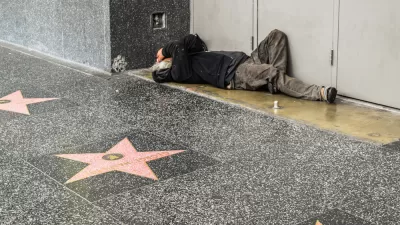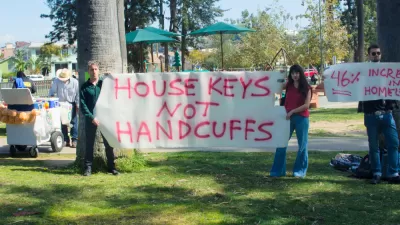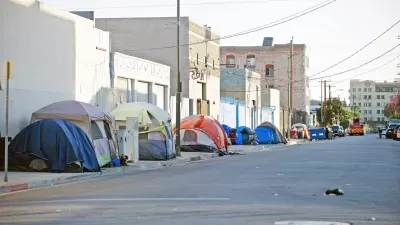The easy part for politicians at both the city and the county of Los Angeles is over. Funding their plans to improve services for the homeless will be the hard part.
"Los Angeles city and county officials approved sweeping plans Tuesday aimed at getting thousands of homeless people off the streets," report Abby Sewell and Emily Alpert Reyes. "But one crucial question remains unanswered: Where will most of the money come from?"
The city of Los Angeles is faced with a growing number of homeless people living on streets, in parks, and under freeway passes around the city. An estimated 44,000 people are homeless countywide. The article offers the details, so far, of both of the policies enacted earlier this week:
The county plan approved Tuesday lays out a blueprint for spending the $150 million over the next two years on a variety of programs to reduce homelessness, on top of the nearly $1 billion a year county officials estimated they spend now on health and welfare services and law enforcement involving the homeless.
The city, in turn, approved a plan that would develop a host of housing programs, create a citywide system of mobile showers and public restrooms and allow overnight parking at designated sites for people who live in their vehicles, among other efforts.
The caution expressed by politicians about the big challenges ahead in funding those plans is buoyed by the words of Pete White, executive director of the Los Angeles Community Action Network, who was among a number of advocates quoted in the article: "We’ve been in this place a number of times….And usually that’s the bottleneck.... We get another report that says, 'We don’t have the money.'"
FULL STORY: L.A. city, county OK homeless plans, but where will the money come from?

Maui's Vacation Rental Debate Turns Ugly
Verbal attacks, misinformation campaigns and fistfights plague a high-stakes debate to convert thousands of vacation rentals into long-term housing.

Planetizen Federal Action Tracker
A weekly monitor of how Trump’s orders and actions are impacting planners and planning in America.

San Francisco Suspends Traffic Calming Amidst Record Deaths
Citing “a challenging fiscal landscape,” the city will cease the program on the heels of 42 traffic deaths, including 24 pedestrians.

Defunct Pittsburgh Power Plant to Become Residential Tower
A decommissioned steam heat plant will be redeveloped into almost 100 affordable housing units.

Trump Prompts Restructuring of Transportation Research Board in “Unprecedented Overreach”
The TRB has eliminated more than half of its committees including those focused on climate, equity, and cities.

Amtrak Rolls Out New Orleans to Alabama “Mardi Gras” Train
The new service will operate morning and evening departures between Mobile and New Orleans.
Urban Design for Planners 1: Software Tools
This six-course series explores essential urban design concepts using open source software and equips planners with the tools they need to participate fully in the urban design process.
Planning for Universal Design
Learn the tools for implementing Universal Design in planning regulations.
Heyer Gruel & Associates PA
JM Goldson LLC
Custer County Colorado
City of Camden Redevelopment Agency
City of Astoria
Transportation Research & Education Center (TREC) at Portland State University
Jefferson Parish Government
Camden Redevelopment Agency
City of Claremont





























